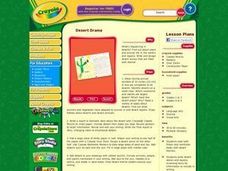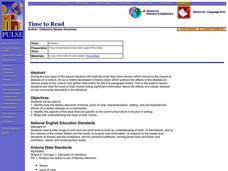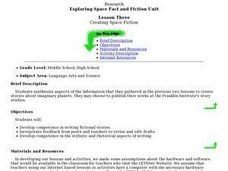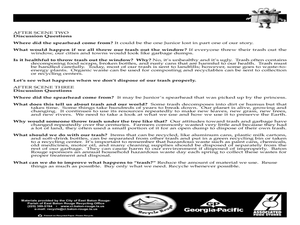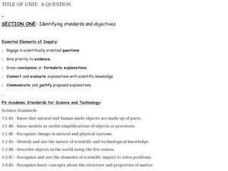Curated OER
Pebbles, Sand and Silt -- Categorizing Fiction and Informational Books
Primary readers complete the activities in a Pebbles, Sand and Silt FOSS kit. As a class, they are given a group of rocks and they are to categorize them based on their activities in the FOSS kit. They use this information and apply it...
Curated OER
Desert Drama
Students read both fiction and nonfiction books with desert themes. Then they write desert stories and reports, reviewing texts for information to include in writing. Students also design desert scenes with details and setting elements...
The New York Times
Writing Fiction Based on Real Science - NYTimes.com
Refuse to alienate your scientific-minded young scholars during your creative writing unit. Learners explore how literary writing can reflect observable fact, and be based in actual science. The links include examples of fiction and...
Curated OER
Exploring Space Fiction
Students visit web sites with information on space fiction and collect information for their stories.
Curated OER
The Similarities and Differences of Setting
Sixth graders identify components of the setting in science fiction text. In this compare and contrast settings lesson plan, 6th graders read Only You Can Save Mankind and identify similarities and differences between science...
Curated OER
Science Fiction Lesson Plans
Students can explore a literature genre through science fiction lesson plans.
Curated OER
Time to Read
Students identify how the literary elements of theme, point of view, characterization, setting, and plot illustrate the effects of a certain disease on a community. They identify the aspects of the book that are specific to the...
Curated OER
Rachel's Life is in a Hole
Explore how lack of access to water impacts peoples' lives in poor countries. Through text reading and discussion, middle schoolers are presented with the story of a young girl who lives and functions with limited water resources. They...
Curated OER
Exploring Space Fact and Fiction Unit: Creating Space Fiction
Learners create stories about imaginary planets.
Curated OER
Life's Lessons: Survival of the Fittest
Students analyze Jack London's use of anthropomorphism to identify the importance of adaptability in life. In this literature lesson, students use the novel The Call of the Wild to identify key elements in survival. Students...
Curated OER
Fitting Trash into Yesterday: A Fifth Grade Activity
Fifth graders explore the concept of waste management. In this recycling instructional activity, 5th graders discover the history of waste management and discuss how the U.S. should respond to the issue of ever-increasing waste.
Curated OER
Animals, Animals, Everywhere
Fourth graders participate in a variety of activities dealing with animal characteristics and classifications in this multi-task lesson. They use graphic organizers, make booklets, and make models.
Curated OER
A QUESTION
Students engage in scientifically oriented questions. They give priority to evidence, draw conclusions/formulate explanations and connect/evaluate explanations with scientific knowledge. Students communicate and justify proposed...
Curated OER
Because of Winn Dixie: Water Management Practices
Fourth graders read the book Because of Winn Dixie and define the characters, setting, and plot. In this Winn Dixie lesson plan, 4th graders also identify quality water management techniques addressed in the story.
Curated OER
Wolves
Young scholars utilize several different sources to research wolves, after completing the K-W-L process.
Curated OER
Silent Spring
High schoolers read background information about Rachel Carson found on the listed website links. They analyze and answer questions about her work and how it is linked to science then they research pesticide usage and alternative methods.

